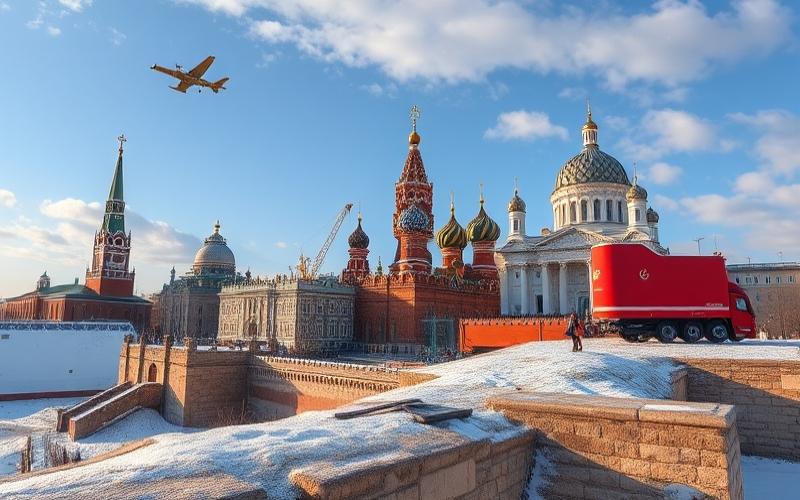
 Published on and written by Cyril Jarnias
Published on and written by Cyril Jarnias
Moving abroad is an exciting adventure, but when it involves relocating with pets, it requires careful planning, especially to specific destinations like Russia.
This article guides you through the essential steps for a smooth move by providing crucial information on health requirements, necessary documents, and practical tips to ensure the well-being of your four-legged companions.
Exploring the specifics of Russian territory, with its standards and regulations, becomes essential to guarantee your pet’s successful integration into this stimulating new living environment.
By informing you about logistical and legal aspects, we’ve gathered advice to turn this process into a seamless experience, free from administrative hassles.
Administrative and Health Procedures for Relocating to Russia
Administrative and Health Procedures for Relocating with Pets to Russia
Documentation and Administrative Formalities
- International or European pet passport, including identification (microchip or tattoo).
- Specific veterinary certificate issued by a veterinarian (form no. 15, no. 41 depending on species).
- Up-to-date vaccination certificate, particularly against rabies.
- Entry permit for certain animals from Rosselkhoznadzor; mandatory if more than two animals or if the owner is not traveling with the pet.
- Advance notification to the airline and recommendation to contact the airport before the flight.
| Required Document | Issued By | Comment |
|---|---|---|
| International/European passport | Licensed veterinarian | Mandatory identification |
| Specific veterinary certificate | Veterinarian/local authority | Form adapted by species |
| Vaccination certificate(s) | Veterinarian | Rabies + other vaccines by species |
| Rosselkhoznadzor permit | Russian authority | If >2 animals or travel without owner |
Vaccination and Treatment Regulations
Mandatory vaccines before entering Russia:
- Dogs:
- Rabies
- Distemper
- Hepatitis
- Viral enteritis
- Parvovirus/adenovirus
- Leptospirosis (unless recognized prophylactic treatment)
- Cats:
- Rabies
- Panleukopenia
Special conditions:
Vaccines must be administered at least 20 days before departure if recent. For first-time vaccination, allow a minimum of 21 days.
- Prior identification mandatory.
- Record/passport containing all up-to-date vaccinations.
Quarantine and Health Inspections
Checks at Russian border crossings:
- Mandatory passage through veterinary health control at authorized entry points (official list available on government websites).
- Presentation of international passport, original veterinary certificate(s).
- Quick inspection by Russian health agent; visual examination and document verification.
No systematic quarantine imposed, except in case of suspected pathological condition during inspection.
| Procedure | Where |
|---|---|
| Veterinary control | Border post/airport |
| Document inspection | Red customs |
| Quarantine | Rare; upon suspicion |
Government Standards and Local Regulations
National standards are supplemented by regional regulations that may restrict certain exotic animal species or impose additional health requirements. In some Russian municipalities:
- Exotic animals (CITES):
– Need for CITES permit for reptiles, rare birds…
– Specific health tests sometimes required locally. - Number of animals allowed:
– Up to two without additional formalities; beyond that, permit required from local authorities.
- Check the official Russian CITES list before any travel with non-common species.
- Inquire with municipal authorities about restrictions specific to each city/region.
Procedures with Local Veterinarians
- Schedule an appointment with a licensed local veterinarian to ensure health record compliance.
- Register with municipal/veterinary services for regular follow-up – recommended to facilitate any subsequent procedures (annual vaccinations, urgent care).
Practical tip: Request a certified translation of the pet record/passport if it’s written in a language other than Russian.
Practical Tips and Recommendations
- Contact multiple airlines to compare pet transport conditions/prices; be aware of variations by weight/size/required crate.
- Prefer direct flights to reduce animal stress; provide comfortable equipment in crate meeting IATA standards.
- Bring basic adapted medical kit: natural sedatives recommended after pre-departure veterinary advice; usual water/food during long-haul travel.
- Anticipate customs procedures: prepare all original documents + paper copies/digital scans readily accessible during customs/health inspection.
| Airline | Max cabin animal weight | Approximate price |
|---|---|---|
| Airline A | 5 kg | Additional baggage |
| Airline B | 8 kg | Based on distance/total weight |
For any successful relocation with your companion,
- Ensure you anticipate all administrative procedures,
- Regularly update their medical record,
- And prioritize their comfort during every stage of the journey!
Good to know:
To enter Russia with your pet, a European pet passport, an up-to-date vaccination certificate including rabies, and parasite treatment are required; in case of non-compliance, quarantine may be imposed upon arrival. It’s advisable to quickly register with local veterinarians for appropriate health monitoring and to inquire about specific regulations in each region.
Secure Animal Transport to Russia
Documents and Regulations for Pet Transport to Russia
- Pet passport or international veterinary certificate.
- Health certificate issued within 5 days prior to travel, certifying the animal is free from contagious diseases.
- Identification by microchip compliant with ISO 11784/11785 standards.
- Up-to-date mandatory vaccinations:
- Dog: rabies (at least 21 days before arrival), distemper, hepatitis, viral enteritis, parvovirus/adenovirus, leptospirosis.
- Cat: rabies (at least 21 days before arrival), panleukopenia.
- First-time vaccination: allow at least 21 days after injection.
- Import permit required depending on country of origin.
- Deworming treatment sometimes required.
| Required Document | Timeframe / Validity | Remarks |
|---|---|---|
| Pet Passport / Certificate | Less than 5 days before departure | Specific form if animal |
Adapting Your Pet to Their New Environment in Russia
Administrative Procedures for Animal Entry into Russia:
- Mandatory identification (microchip or legible tattoo).
- Up-to-date vaccination:
- Dogs: rabies vaccination, distemper, hepatitis, parvovirus, leptospirosis, parainfluenza, coronavirus.
- Cats: rabies vaccination, panleukopenia, viral rhinotracheitis, calicivirus.
- Rabies antibody titer (≥ 0.5 IU/ml), performed at an approved laboratory.
- Official veterinary health certificate (specific form by species, e.g., no. 15 or no. 41), written in Russian or English, validated by veterinary authorities of country of origin.
- Rosselkhoznadzor authorization required for:
- More than two animals per person.
- Animals not accompanied by their owner.
- Mandatory passage through veterinary control point at arrival airport.
- Presentation of all documents upon arrival: veterinary control and issuance of international health certificate.
| Requirement | Detail |
|---|---|
| Identification | Microchip or tattoo |
| Mandatory vaccines | Rabies, others by species |
| Rabies titer | ≥ 0.5 IU/ml, approved labs |
| Health certificate | Official, in Russian or English |
| Control points | International airports (e.g., Sheremetyevo, Domodedovo) |
| Special cases | Rosselkhoznadzor authorization if >2 animals or unaccompanied |
Adaptation Measures for Russian Climate:
- Prefer cold-adapted breeds or provide appropriate equipment (insulating coats, dog boots).
- Limit outdoor time during extreme temperatures (Siberian winter).
- Provide a warm, dry indoor space for pets.
- Regular hydration, as indoor air is often dry in winter.
- Monitor paw pads and skin: risk of cracking due to cold and de-icing salt.
Recommended Equipment for Russian Winter:
- Thermal or waterproof coat.
- Non-slip insulating boots.
- Absorbent litter to prevent moisture.
- Protective balm for paw pads.
Tips for Adapting to Urban or Rural Life in Russia:
In the city:
- Leash walks mandatory in most public spaces.
- Search for green spaces or parks accepting animals.
- Choose housing with secure balcony or courtyard access.
- Gradual socialization to urban environment: noises, traffic, other animals.
In the countryside:
- More space for exercise, but beware of wildlife and parasites.
- Check property fencing to prevent escapes.
- Adaptation to local wildlife (foxes, hedgehogs, birds, etc.).
| Environment | Advantages | Precautions |
|---|---|---|
| Urban | Access to services, parks, veterinarians | Noise, traffic, limited spaces |
| Rural | Freedom of movement, large spaces | Local wildlife, isolation, parasites |
Russian Pet Feeding Habits:
Wide availability of industrial kibble and wet food, mainly international and Russian brands.
Some local habits include preparing homemade meals (boiled meat, buckwheat, rice, vegetables).
Warning: avoid giving salty, spicy, or fatty human food (traditional Russian diet often unsuitable for pets).
Feeding Tips:
- Prefer complete foods adapted to species/age/activity.
- Gradually introduce any new food to avoid digestive issues.
- Check availability of usual brand before departure, or plan a transition.
Finding an English-Speaking Veterinarian or One Familiar with Expats:
- Search for veterinary clinics in major cities (Moscow, Saint Petersburg): some veterinarians speak English.
- Use expat forums or social media groups for recommendations.
- Ask the embassy or consulate for lists of partner veterinarians.
- Schedule appointments in advance to ensure availability of an English-speaking practitioner.
Practical Tips:
- Keep digital copies of veterinary documents (vaccinations, passport, health certificate).
- Prepare a pet-specific first aid kit.
- Learn about local veterinary emergency numbers.
Key Takeaways:
Bringing a pet into Russia requires careful document preparation, specific vaccinations, adaptation to a demanding climate, and anticipation of dietary and veterinary needs. The pet’s integration will depend on the chosen living environment and gradual adaptation to the Russian surroundings.
Good to know:
Ensure your pet has the necessary vaccines and an up-to-date health certificate to enter Russia, and consider equipping your companion for harsh winters; prioritize housing with outdoor space and seek English-speaking veterinarians for easier medical follow-up.
Understanding Animal Services and Local Legislation
Understanding animal services and local legislation in Russia for relocating with pets
Main Animal Services in Russia
- Veterinarians: Major Russian cities (Moscow, Saint Petersburg, Leningrad) have well-equipped veterinary clinics, often with English-speaking staff. Services cover routine care, emergencies, vaccination, and surgery.
- Pet boarding: Mainly in large urban centers, offering accommodation, daily care, walks, and sometimes specialized services (grooming, training).
- Specialty stores: Wide selection of food, accessories, care products, and toys for pets. Some stores also offer nutrition and behavior advice.
Legislation on Pet Import and Export
| Element | Requirement for Russia |
|---|---|
| Animals admitted | Dogs, cats, ferrets (max. 2 animals per traveler without commercial procedure) |
| Identification | Microchip mandatory |
| Vaccinations | Dogs: rabies, distemper, hepatitis, viral enteritis, parvovirus, adenovirus, leptospirosis. |
| Cats: rabies, panleukopenia. | |
| Certificates | International veterinary passport or official veterinary certificate (form no. 15 for young animals) |
| Vaccination timeframe | Vaccines administered at least 20 days before departure (or 21 days for first-time vaccination) |
| Specific tests | Fungal analyses (e.g., ringworm) mandatory depending on country of origin |
| Quarantine | No systematic quarantine except suspicion of disease or non-compliance with requirements |
| Export | Official zoosanitary certificate, sometimes additional tests required depending on destination country |
Vaccination and Microchip Requirements
- Identification: Mandatory microchip, compliant with ISO 11784/11785 standard.
- Mandatory vaccinations:
- Dogs: Rabies, distemper, hepatitis, viral enteritis, parvovirus, adenovirus, leptospirosis.
- Cats: Rabies, panleukopenia.
- Timeframes: Vaccination at least 20 days before departure, 21 days for first-time vaccination.
- Puppies and kittens not vaccinated against rabies
Disclaimer: The information provided on this website is for informational purposes only and does not constitute financial, legal, or professional advice. We encourage you to consult qualified experts before making any investment, real estate, or expatriation decisions. Although we strive to maintain up-to-date and accurate information, we do not guarantee the completeness, accuracy, or timeliness of the proposed content. As investment and expatriation involve risks, we disclaim any liability for potential losses or damages arising from the use of this site. Your use of this site confirms your acceptance of these terms and your understanding of the associated risks.























































